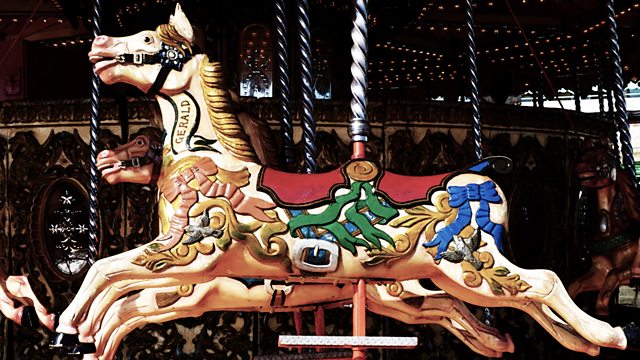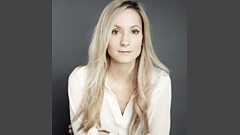
Travelling Fairs and Circuses
The weekly sequence of music, poetry and prose takes time to visit the fair, with words by Hardy, Wordsworth, Bunyan and Lorca, and music by Debussy, Stravinsky and Richard Rodgers
The weekly sequence of music, poetry and prose takes time out to visit the world of excitement, bargains, colour, debauchery and petty crime that is the fair, with words by Hardy, Evelyn, Bunyan, Wordsworth, Dickens and Lorca, and music by Debussy, Stravinsky and Richard Rodgers, June Tabor and The Beatles among others. Joanne Froggatt and James Bolam are the readers.
Last on
Music Played
Timings (where shown) are from the start of the programme in hours and minutes
-
Federico García Lorca, translated by Jerome Rothenberg
A Moon at the Fair, read by Joanne Froggatt
![]() 00:00
00:00Igor Stravinsky
Petrushka - excerpt
Performer: Budapest Festival Orchestra, Iván Fischer (conductor).- HUNGAROTON HCD31095.
- Tr 8.
![]() 00:04
00:04Igor Stravinsky
Petrushka (excerpt)
Orchestra: Budapest Festival Orchestra. Conductor: Iván Fischer.William Wordsworth
The Prelude, Book 7, read by James Bolam
![]() 00:08
00:08Trad. English
Jockey to the Fair
Performer: Magpie Lane.- BEAUTIFUL JO BEJOCD6.
- Tr 11.
John Evelyn
Diary extract, read by James Bolam
![]() 00:11
00:11Anon. English
Playford Set - excerpt
Performer: Giles Lewin (fiddles).- PARK RECORDS PRKCD103.
- Tr 1.
![]() 00:12
00:12Traditional English
Jockey to the Fair
Ensemble: Magpie Lane.James Greenwood
Unsentimental Journeys; or Byways of the Modern Babylon, read by James Bolam
![]() 00:14
00:14Anonymous
Playford Set
Performer: Giles Lewin.![]() 00:16
00:16The Beatles
Being For The Benefit Of Mr. Kite!
- PARLOPHONE CDP7464422.
- Tr 7.
Charles Dickens
Hard Times, read by Joanne Froggatt
![]() 00:20
00:20Lennon-McCartney
For the Benefit of Mr Kite
Ensemble: The Beatles.![]() 00:20
00:20Richard Rodgers
Carousel Waltz
Performer: Unnamed orchestra conducted by Alfred Newman.- CAPITOL CDP7466352.
- Tr 1.
Federico García Lorca, translated by Jerome Rothenberg
Wooden Horses, read by Joanne Froggatt
![]() 00:24
00:24Tom Waits
Black Rider
Performer: Tom Waits.- ISLAND 524 519-2.
- Tr 4.
![]() 00:24
00:24Richard Rodgers
Carousel Waltz
Orchestra: Orchestra. Conductor: Alfred Newman.John Bunyan
The Pilgrims Progress, read by James Bolam
![]() 00:28
00:28Tom Waits
Black Rider
![]() 00:30
00:30Nick Cave
The Carny
Performer: Nick Cave & the Bad Seeds.- MUTE CDSTUMM34.
- Tr 4.
![]() 00:33
00:33Nick Cave & the Bad Seeds
The Carny
Anon.
Animal Fair, read by Joanne Froggatt
![]() 00:38
00:38Igor Stravinsky
Circus Polka
Performer: London Symphony Orchestra, Michael Tilson Thomas (conductor).- RCA 09026688652.
- Tr 2.
John Updike
Topsfield Fair, read by Joanne Froggatt
![]() 00:42
00:42Igor Stravinsky
Circus Polka
Orchestra: London Symphony Orchestra. Conductor: Michael Tilson Thomas.![]() 00:42
00:42Trad. English
The Wherligig
Performer: The Harp Consort, Andrew Lawrence-King (director).- DEUTSCHE HARMONIA MUNDI 05472775162.
- Tr 16.
Thomas Hardy
The Mayor of Casterbridge, read by Joanne Froggatt
![]() 00:46
00:46Traditional English
The Wherligig
Ensemble: The Harp Consort. Conductor: Andrew Lawrence‐King.![]() 00:47
00:47Ralph McTell
The Hiring Fair
Performer: Vikki Clayton.- ROAD GOES ON FOREVER RGFCD013.
- Tr 13.
![]() 00:51
00:51Ralph McTell
The Hiring Fair
Performer: Vikki Clayton.William Cobbett
Rural Rides, read by James Bolam
![]() 00:55
00:55Trad. English
Scarborough Fair
Performer: Martin Carthy.- FREE REED FRQCD60.
- Tr 1.
![]() 00:59
00:59Traditional English
Scarborough Fair
Performer: Martin Carthy.Austin Clarke
The Fair at Windgap, read by James Bolam
![]() 01:02
01:02Claude Debussy
Fêtes (from 3 Nocturnes)
Performer: Montreal Symphony Orchestra, Charles Dutoit (conductor).- DECCA 425 502 2.
- Tr 7.
![]() 01:06
01:06Claude Debussy
Fetes (Nocturnes)
Orchestra: Orchestre symphonique de Montréal. Conductor: Charles Dutoit.Thomas Hardy
After the Fair, read by Joanne Froggatt
![]() 01:09
01:09John Tams
Pull Down Lads
Performer: June Tabor.- TOPIC TSCD298.
- Tr 10.
![]() 01:13
01:13John Tams
Pull Down Lads
Performer: June Tabor.Producer note
Do you find fairgrounds fun, or frightening? I thought at first that my answer was the former, and that putting together a programme about travelling fairs and circuses, their excitement, seasonal evocativeness and sense of celebration, would be all painted horses, candy floss and dancing on the village green. The further I got, however, the more it became apparent that their dark side – their noise, gaudiness, abandon, debauchery, criminality, even death (and actually, aren’t those painted horses sometimes a bit scary?) is what seems to have preoccupied many of the musicians and writers to have come to the subject. Lorca’s set of poems entitled (in some cases enigmatically) ‘Fairs’ hints at danger with typical effortlessness and economy, while John Bunyan pictures his imagined ‘Vanity Fair’ as a trap for the virtuous laid by the Devil, no less. In his poetic memoir The Prelude, Wordsworth cannot hide a certain fascination with the sheer bustle and colour of London’s�� Bartholomew Fair, but his final image of it is ugly, and though there is humour in Victorian journalist James Greenwood’s account of Barnet Fair, it is truly a polemic of disgust.
On a note perhaps more melancholy than indignant, John Updike laments the predicament of the caged animal in his poem ‘Topsfield Fair’;�� William Cobbett, visiting on a ‘rural ride’ one of the biggest livestock fairs in Britain at Weyhill in Hampshire, is struck by the plight of farmers in a depressed market; and Thomas Hardy famously took an account he read in a newspaper of a man drunkenly selling his wife at a horse fair as the seed of his novel The Mayor of Casterbridge. ��
Musicians also seem to have seen fairs as settings for the sinister: the Shrovetide Fair in Stravinsky’s ballet Petrushka is a scene for love, jealousy and death; Tom Waits runs a ride that you would not let want to let your children on; and the dark goings-on in Nick Cave’s The Carny sound too gruesome to contemplate.
Yet some have found untainted pleasure in thoughts of the fair, such as the Irish poet Austin Clarke, whose reminiscence of ‘The Fair at Windgap’ glints with nostalgia (including, one suspects, for the fight at the end of it!), or John Evelyn, whose diary account of one of the great 17th-century Thames frost fairs is lit by a sense of pleasurable wonderment. Love can hatch on the fairground too, as in Ralph McTell’s song ‘The Hiring Fair’ (sung by Vikki Clayton), and perhaps in the minds of the young women wandering homeward in Hardy’s ‘After the Fair’. Naturally this poem is the last spoken item in today’s programme, to be followed by a coda of suitably weary content in June Tabor’s song of a site being struck in Pull Down Lads. Roll up everybody!
��
Lindsay Kemp
Broadcasts
- Sun 30 Nov 2014 17:30�鶹Լ�� Radio 3
- Sun 17 May 2020 17:30�鶹Լ�� Radio 3
The hidden history of plant-based diets
Books website
Get closer to books with in-depth articles, quizzes and our picks from radio & TV.
Gallery



